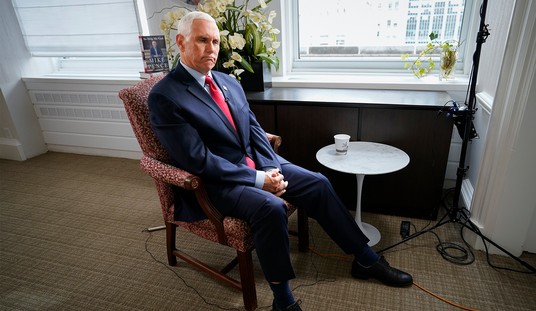Last Tuesday, Rep. Barney Frank (D-MA) finally got around to it. With Treasury Secretary Tim Geithner as the guest star, the House Committee on Financial Services convened to ponder “the future of housing finance” — specifically, how to clean up in the aftermath of the collapse of Fannie Mae and Freddie Mac. So-called government-sponsored enterprises, or GSEs, Fannie and Freddie have now drained hundreds of billions of taxpayer dollars with no end in sight.
But while the GSEs went belly-up, costing Americans dearly, the fortunate few sitting on their Boards of Directors got filthy rich. These same directors — some of the biggest names in Democratic Party politics and business — failed spectacularly to fulfill their fiduciary obligations.
As it turns out, former President Clinton packed the boards of Fannie Mae and Freddie Mac with virtually as many personal allies and beneficiaries as they could hold. The most visible was Franklin Raines — Fannie Mae chairman, CEO, and former Clinton budget chief — who later resigned in disgrace with a multi-million parachute.
And then there’s President Obama’s current White House Chief of Staff Rahm Emanuel, who served on Fannie Mae’s board for a mere 14 months and raked in a cool $320,000.
Clinton also packed the Fannie board with Democratic Senator and “Keating Five” defendant Dennis DeConcini. Hillary Clinton’s confidante Jamie Gorelick got a prized seat, as did Bill and Hillary favorite Harold Ickes, Democratic strategist.
A federal report by the Office of Federal Housing Enterprise Oversight condemned the boards of both Fannie and Freddie, calling their actions contributing to the housing meltdown “malfeasance.” Freddie Directors like Emanuel were blasted for failing to confront the “management issues that were root causes of many of the problems that led to the ongoing restatement of the financial reports of the Enterprise,” and permitting management to profit from cooking the books to the tune of $5 billion in 2003 alone.
But even a brief stay on the Fannie or Freddie Boards was its own source of fat profits. Among the rewards for Democratic Party “public service,” a lucrative board membership on Fannie and Freddie was considered the Taj Mahal of plum positions. Now, as the housing market limps forward and there are warnings of a new wave of foreclosures, the culpable coterie remains largely anonymous.
What’s more, this group of lifetime political hacks puts the Obama administration at risk, just as it struggles to forge a way forward through the financial wreckage wrought while America’s wealthiest, most powerful Democrats made their careers.
Rahm Emanuel has come under particular scrutiny, with a series of reports by the Chicago Tribune making waves across the Internet. The inexperience and poor management of former HUD Secretary Andrew Cuomo is already well documented. But who else was involved in the largest single housing implosion in our nation’s history?
— Dennis DeConcini, one of the infamous Keating Five, told the Spokesman Review in 2003 of an early White House chat with Clinton: “You’ve been a great friend, Dennis, what can I do for you?” “I told him I wanted to be on the board of Freddie Mac or Fannie Mae.”
— Jamie Gorelick is a close confidant of Hillary Clinton. Gorelick joined WilmerHale, the high-powered firm representing Fannie Mae, on July 1, 2003, the same day she stepped down from Fannie’s Board.
— Michael Lewis, author of The Big Short, wrote a lengthy profile of Harold Ickes called “Bill Clinton’s Garbage Man,” in no less respectable a publication than the New York Times.
— Jack Quinn was Al Gore’s chief of staff and counsel.
— Eli Segal was a Clinton senior adviser.
But these are hardly the only holdovers from the network of friends and associates who dominated politics in the Clinton era to have made hay while overseeing the fatal errors that nearly destroyed the American economy.
Other Clinton appointees include:
— Neil Hartigan, former Illinois attorney general
— Maynard Jackson, two-time Democratic mayor of Atlanta
— Jose Villarreal, deputy manager of Bill Clinton’s ’92 presidential campaign and senior advisor for Hillary’s own White House run
— California Congressman Esteban Torres
— Garry Mauro, the Clintons’ man in Texas who lost to George W. Bush in the 1998 race for governor
— and none other than William Daley, brother of Chicago Mayor Richard Daley, chairman of Al Gore’s 2000 campaign for president, Clinton Commerce secretary, and named advisor to President Obama’s transition team.
Clinton’s appointees were right at home on the boards of Fannie and Freddie. Raines’ predecessor at Fannie (1991-1998) was prominent Democrat and power broker James Johnson, whose compensation at Fannie went underreported to the tune of some $15 million.
Faced with the colossal negligence of Fannie and Freddie directors installed by their pal and patron President Bill Clinton, Secretary Geithner could hardly blunt the own force of his damning congressional testimony on Tuesday. In the absence of proper congressional oversight, said Geithner, “risk tends to migrate from where it’s constrained to where it is unconstrained” — in other words, from private markets, where investments are not explicitly or implicitly backed by the full faith and credit of the federal government, to Fannie and Freddie, which ruthlessly promoted themselves as the safest, most profitable places to put money. “Risk tends to move to where regulations are weaker,” Geithner admitted, and where “the supervisor is more compliant or less experienced.”
The cozy Clinton network made big under what Geithner called “a system in which you have this awkward combination of private shareholders with a broad sense of explicit/implicit support.” Calling that system “a terrible mistake,” Geithner labeled the further “mistakes” that it multiplied “very consequential.” Policymakers “can at least agree,” he said, that “we should not recreate that fatal mix of public and private shareholders in the same institution.”
Geithner specifically pinpointed the beginning of Fannie and Freddie’s abuses “in the late 1990s and in the last decade,” when boards permitted “a dramatic increase in risk on their balance sheets and a substantial erosion in underwriting standards more broadly.” These actions “caused a huge amount of damage,” Geithner concluded.
The secretary did not name names, but they are public record: a litany of Clinton associates and friends whose success in propelling themselves and one another into the stratosphere of American high society has earned them a reputation as crony capitalists.
“Rather than an active, concerned Board that effectively supervised senior management,” wrote Armando Falcon, Jr. in his 2006 report for the Office of Federal Housing Enterprise Oversight, “the Board of Directors was a passive and complacent entity, controlled by, rather than controlling senior management.” Falcon revealed how “the Board and its Committees missed a host of opportunities to uncover and control” what he termed outright “malfeasance.” Falcon concluded that a Board “operating in accordance with generally accepted standards of prudent operation would have prevented much or all of those losses.”
President Obama can hardly be blamed for the economic disaster handed him by the masters of the Clinton universe. But the daunting task of recovery and reform will be made all the more vexatious by Obama’s reliance on more than a few of those same powerful cronies, from Emanuel to Hillary Clinton herself. Their reach into Chicago politics, where Obama ostensibly enjoys a home-court advantage, is long and deep, and their influence on Democratic politics remains profound. Despite Secretary Geithner’s tacit admission that Clintonistas like Cuomo, Emanuel, and the rest are responsible for the current crisis, President Obama may find it politically impossible to purge his administration — and the Democratic Party itself — of their influence.
On March 29, writing in Forbes magazine, Editor-in-Chief Steve Forbes warned that when Washington finally gets around to dealing with Fannie and Freddie, politicians will loudly proclaim that they will truly reform these entities to prevent another disaster,” passing the toughest regulations yet. But this pledge “will come at a price. To appeal to voters, Congress will pressure the new Fannie and Freddie to make it easier for constituents to get mortgages. In turn, the ‘reformed’ companies will know they couldn’t long survive free-market competition without that ultimate backstopping from Uncle Sam. As before, congressional relatives, former staffers and retired pols will find lucrative perches in these companies or their affiliates.”
Having learned a painful lesson from the Bush years, Republicans are at work centering the party around opposition to the transformation of ever-wider sectors of the economy — from the automotive industry to the nation’s health care — into new Fannies and Freddies. The lesson Obama Democrats seem to have learned from the recklessness and malfeasance of the Clinton years is much different: if you can’t beat ‘em, join ‘em.









Join the conversation as a VIP Member